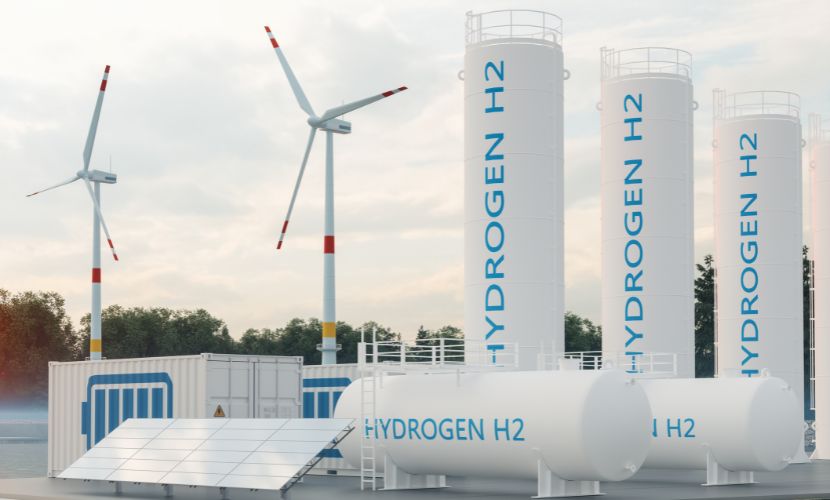The global hydrogen electrolyzer market is poised for substantial growth, projected to expand at a CAGR of 63.9% from 2024 to 2032, reaching approximately USD 83,260.10 million by 2032. Electrolyzers are crucial in producing hydrogen through water electrolysis, leveraging renewable energy sources. The increasing focus on clean energy solutions to mitigate carbon emissions is a primary driver for market growth. Governments and industries worldwide are investing in hydrogen infrastructure, driving demand for electrolyzers in sectors like energy storage, transportation, and industrial applications.
Hydrogen Electrolyzer Market Dynamics
The dynamics of the hydrogen electrolyzer market are driven by rapid technological advancements, growing investments in renewable hydrogen production, and supportive government policies promoting green hydrogen initiatives. The market faces challenges such as high initial costs and technological limitations, yet opportunities abound with increasing R&D activities and collaborations among stakeholders to enhance electrolyzer efficiency and reduce costs.
Hydrogen Electrolyzer Market Trends
Key trends in the hydrogen electrolyzer market include the adoption of PEM (Proton Exchange Membrane) electrolyzers due to their efficiency and scalability, advancements in alkaline electrolyzer technology for industrial applications, and the integration of electrolyzers with renewable energy sources to produce green hydrogen. Additionally, there is a rising trend towards modular electrolyzer systems that offer flexibility and cost-effectiveness in hydrogen production.
Hydrogen Electrolyzer Market Segmentation
The segmentation of the hydrogen electrolyzer market categorizes it into distinct groups based on several key factors, which collectively define its landscape and application across various industries. Here’s a detailed breakdown of the segmentation:
- By Product Type:
- PEM (Proton Exchange Membrane) Electrolyzers: These are compact and efficient electrolyzers suitable for applications requiring high purity hydrogen, such as fuel cells for vehicles and stationary power generation.
- Alkaline Electrolyzers: Known for their robustness and long operational life, alkaline electrolyzers are traditionally used in large-scale industrial applications due to their cost-effectiveness.
- Solid Oxide Electrolyzers: Operating at high temperatures, solid oxide electrolyzers are suitable for applications where process heat integration is beneficial, such as in industrial processes requiring both hydrogen and heat.
- By Capacity:
- Small Scale (< 500 kW): These electrolyzers are typically used for niche applications or decentralized hydrogen production, such as for refueling stations or small industrial sites.
- Medium Scale (500 kW – 2 MW): Medium-scale electrolyzers cater to larger industrial applications and hydrogen production facilities, providing a balance between efficiency and operational scale.
- Large Scale (> 2 MW): Used in heavy industries and large-scale hydrogen production facilities, these electrolyzers offer high capacity and are crucial for meeting large-scale demand in sectors like chemical manufacturing and energy storage.
- By Application:
- Power Generation: Electrolyzers used in power-to-gas applications to store excess renewable energy by converting it into hydrogen for later use in fuel cells or other applications.
- Transportation: Electrolyzers for producing hydrogen used directly in fuel cell electric vehicles (FCEVs) and hydrogen fueling stations.
- Industrial Feedstock: Hydrogen produced for use as a feedstock in various industrial processes, such as in the production of ammonia or methanol.
- Others (Chemicals, Electronics): Specialty applications where high purity hydrogen is required, such as in semiconductor manufacturing or pharmaceutical industries.
- By Region:
- North America: Significant investments in hydrogen infrastructure and supportive policies driving market growth.
- Europe: Leading in renewable energy adoption and hydrogen initiatives, fostering a robust electrolyzer market.
- Asia-Pacific: Rapid industrialization and increasing focus on clean energy solutions contributing to market expansion.
- Middle East & Africa: Emerging interest in hydrogen as an alternative energy source, with potential for future market development.
- Latin America: Initiatives to harness renewable resources for hydrogen production, albeit at a slower pace compared to other regions.
Hydrogen Electrolyzer Market Growth
The hydrogen electrolyzer market is experiencing robust growth driven by increasing demand for clean hydrogen across various industries. Technological advancements and favorable government policies supporting hydrogen infrastructure development are expected to fuel market expansion further.
Get a Free Sample Report with Table of Contents
Recent Developments in the Hydrogen Electrolyzer Market Scope
Recent developments include strategic partnerships between technology providers and industrial manufacturers to scale up electrolyzer production capacity, significant investments in R&D for electrolyzer efficiency improvements, and initiatives to establish hydrogen hubs and pilot projects globally.
Hydrogen Electrolyzer Market Analysis and Competitor Analysis
The market analysis reveals a competitive landscape with key players such as Nel ASA, ITM Power, Siemens Energy, and Hydrogenics Corporation dominating the market. Competitive strategies include product innovations, mergers and acquisitions, and strategic alliances to strengthen market presence.
Key Players
Leading players in the hydrogen electrolyzer market are investing in research and development to enhance product efficiency and expand their global footprint. They are pivotal in shaping the market through technological advancements and strategic collaborations.
FAQ
Q: What are the primary factors driving the growth of the hydrogen electrolyzer market?
A: The market is driven by increasing investments in renewable hydrogen production, supportive government policies, and technological advancements in electrolyzer technology.
Q: Which regions are expected to witness significant growth in the hydrogen electrolyzer market?
A: Asia-Pacific and Europe are anticipated to experience substantial growth, supported by initiatives promoting clean energy solutions.
Q: What are the challenges faced by the hydrogen electrolyzer market?
A: High initial costs, technological constraints, and infrastructure limitations are key challenges hindering market growth.
